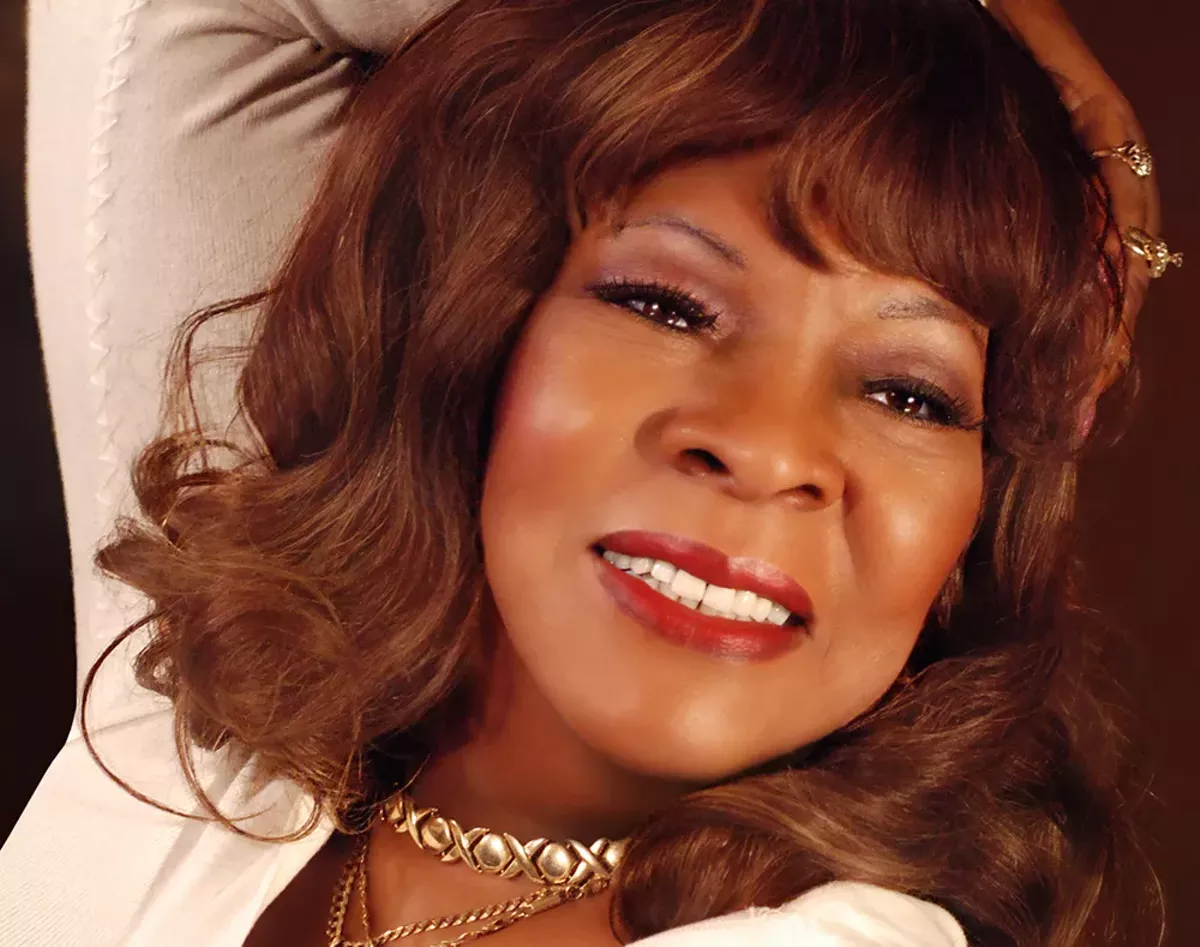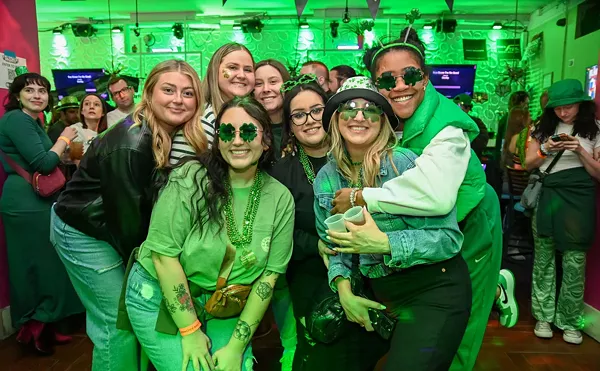When Martha Reeves bypassed an audition line in front of Berry Gordy's Motown Records in 1960, it was by mistake. Wielding a business card given to her the night before by Motown's A&R director Mickey Stevenson, Reeves — then just 20 years old — suddenly found herself on the frontlines of a musical movement. She was instantly tasked with answering phones, managing payroll, and steering the very ship she would quickly come to call home after spinning her position as the studio's first secretary into one of the most sought after vocal talents in Motown.
Now 77, Reeves' career has allowed her to see the world. But it is her love of Detroit that has kept her coming back to the city that made her and doing what she was born to do. She has survived the changing tides of the music industry thanks to the sustainability of hit songs under her girl group Martha Reeves and the Vandellas: "Jimmy Mack," "Nowhere to Run," "(Love is Like a) Heatwave," and the goosebump-inducing "Dancing In the Street." She's also recovered from a highly criticized term on the Detroit City Council, which ended in 2009. ("I am not a politician," Reeves said in a 2011 interview. "You have to be dishonest to be a politician.")
What Reeves is is a performer. Sometimes performing up to 30 weeks a year, she never tires of reliving her hits. In fact, she says it continues to excite her. No matter how many times she has detailed the events that unfolded the moment she walked into Motown Records, the first time she set eyes on Marvin Gaye, or what it felt like hearing "Dancing In the Street" on the radio in her parents' living room, Reeves is happy to share her history because she's still making it.
As Reeves gears up to headline the Hamtramck Labor Day Festival with the Vandellas, she shares the secret behind that signature Motown sound and why "Dancing In the Street" should be taken literally.
Metro Times: You recently turned 77, and during that time Detroit has seen many changes. Do you still live in Detroit? How has the city changed for you?
Martha Reeves: I moved to New York for a minute, I lived in L.A., but Detroit is home and Detroit is where I feel good. It's wonderful to see it grow. I spent four years on the Detroit City Council, and you learn alot about the functionality of Detroit and how it's being developed. It's coming back, as people say. But to me, it never went anywhere. I'm glad to be a part of the music makers and original Motown artists who established the Motown sound, and we couldn't have done it if not for the love of the people here who supported us and allowed us to do it enough times to learn how.
MT: We've heard that you nailed "Dancing in the Street" on your first try, but they hadn't recorded it. So, the version we know and love was only your second time ever singing it. How did "Dancing in the Street" come about?
‘Detroit is home and Detroit is where I feel good. ... It’s coming back, as people say. But to me, it never went anywhere.’
tweet this
Reeves: I had heard Marvin Gaye sing it a couple of times because he wrote it and it was originally going to be his recording. I had just finished my course in artist development across the street and I was standing there in awe of Marvin just looking and admiring him because he was such a fine man and he sang so good. And he was singing, "Calling out around the world are you ready for a brand new beat, baby" in that sort of a sexy voice that he would use when he sang "The Star-Spangled Banner." I was looking at him and he looked at me and said "Hey, man, let's try this song with Martha" to Mickey Stevenson and Ivy Hunter, who were co-writers on the song. Well, I had listened to him long enough to halfway know it but I couldn't sing it with his pitch or style so I asked him, "Can I sing it the way I feel it?" He said "Yeah, go ahead."
I thought about dancing in the street as a child. We used to have Saturday parties where my dad, who worked for the city, had police horses and yellow tape block the street off and we'd eat everybody's chicken out on the cobblestone streets, everybody had little tiny houses, but we come out in the street and party until the sun went down. So that's what I remembered. I thought about having a good time with my community and it turned out to be a song for the world.
MT: Mark Kurlansky released a book in 2013, Ready for a Brand New Beat: How 'Dancing in the Street' Became the Anthem for a Changing America. Were you aware that you had made a protest song?
Reeves: I heard rumors. Sometimes rumors bring a lot of attention to you but they said it was used as a theme song for the Black Panthers. I didn't know any Black Panthers and I don't think the words would make you go in and break into somebody's store or riot in the street. If someone took it as a protest song then, you know, they use songs to sell cars, they use some songs to sell soap. That song is magic from the trumpet in the beginning. It's like how I felt when I watched the bullfights in Spain. It's exciting.
I think it's the theme song of Motown. If you think of Motown you've got to think of "Dancing in the Street." I'm so proud to have had Marvin look at me and say with that great handsome wonderful voice, "Let's pass this song to Martha." I was flattered because I didn't think Marvin paid me any mind. But he admired my vocal talent and I loved his vocal talent and that was a great exchange.
MT: "Nowhere to Run" has such a powerful energy. Where were you drawing from for that performance?
Reeves: You didn't turn Motown down. If they called, you stopped whatever you were doing. I was at home recovering from the flu. So, when I walked into the studio, I heard Eddie Holland singing "Nowhere to Run" with Brian Dozier and Ivy Hunter. I had to instantly recover. You can hear I'm kind of whining on there because that's how I was feeling. The melancholy voice I used was actually from the flu. I had nowhere to run!
MT: You keep referring to the Motown sound. What do you think was signature in making the Motown sound?
Reeves: The secret to the Motown sound is they used live musicians. They were actually producers themselves, the musicians. The Funk Brothers played with all of the recording artists of Motown and if a song was for the Temptations they would give them another sound. If it was the Supremes, they'd give them another sound. Everyone had their own production, style, and tactics.
You can tell whose song it is just by the intro. Motown is made up of a lot of unsung heroes. Freddie Gorman, who wrote "Mr. Postman," was actually a postman. We got to know the musicians and they showed us their love by playing behind us and making us great.
MT: Berry Gordy's Motown is so often referred to as resembling a family. Does that mean there weren't any rivalries?
Reeves: Oh, there was rivalry. We would stand outside of the recording studio, Studio A, and if someone couldn't get a song in two or three takes we'd say, "Hey, can we do it?" That was the rivalry.
MT: Looking back, there are so many special moments in your career. Does anything stand out as your most prized accomplishment?
Reeves: I have a son and grandchildren and great grandchildren. I'm so proud of my son. My first performance was at three years old in my grandfather's church, with my older brothers, and just being loved by mom enough for her to teach me how to sing was a blessing.
Music has been around me all my life. My dad played blues guitar. Music was our life, because we had no TV in those days. We would look at the radio and listen to The Lone Ranger, The Shadow, Amos 'n' Andy. And dad would take his guitar down and we'd have music. He had a band that would play upstairs in our attic.
It's a spiritual time for me whenever I am able to use my voice and sing the songs that people have loved over the years and heard a thousand times thanks to DJs who made them love it, and they'd take their dollar and go buy a 45. You know, I had to tell a kid the other day that a 45 was not a gun: "No, we did not all have guns. We'd put them on the radio, and we'd put them on the record player." And he asked, "What's a record player?" because all of those little things are like history. I still cherish my vinyls. But I still appreciate listening to the needle on the vinyl — it's everlasting. I prayed to be a singer and God heard me and let me be a singer. I know I'm blessed.
Martha Reeves and the Vandellas will headline the Hamtramck Labor Day Festival at 9 p.m. on Monday, Sept. 3 at the South Stage; Joseph Campau, Hamtramck; hamtownfest.com; Event is free and open to the public.
Get our top picks for the best events in Detroit every Thursday morning. Sign up for our events newsletter.







